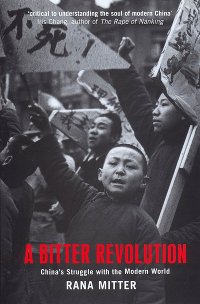A Bitter Revolution (micro article)
_This is an ultra-short article that attempts to cover the ‘Bitter Revolution’ in the title of Rana Mitter’s book, and why the word ‘bitter’ is used, in less than 250 words._
 The “Bitter Revolution” in Rana Mitter’s book refers initially to the May Fourth Movement of 1919, and also to how those events formed a basis for the more internationally famous changes that took place in China in the following decades. Thus “bitterness” could be seen as a reference to the long-lasting effects of the Movement.
The “Bitter Revolution” in Rana Mitter’s book refers initially to the May Fourth Movement of 1919, and also to how those events formed a basis for the more internationally famous changes that took place in China in the following decades. Thus “bitterness” could be seen as a reference to the long-lasting effects of the Movement.
These demonstrations, focused in Beijing and Shanghai and carried out mainly by students, attacked the new government for its inability to secure China’s interests in the Treaty of Versailles, in particular the return of Shandong province to Chinese sovereignty, which had a been a condition of Chinese support for the Allies in World War II. The violent attack and arson of Cao Rulin’s house (an attractive target as he had been part of the envoy at the Paris Peace Conference as well as being the official who signed the Japanese 21 Demands) amongst others, was the culmination of protests outside the Tiananmen. This destruction demonstrates Mitter’s view that “China must go through terrible pain [bitterness] to reach salvation”.
The phrase “bitter revolution” comes from the words of Lu Xun – “Revolution is a bitter thing”. Lu Xun was a highly influential writer during the time of the May Fourth Movement, and after his death was idolised by the Communist Party as a figurehead for the Cultural Revolution. However, the Party felt it necessary to reject his links with the events of 1919 and his critical approach to politics; this theme of betrayal (and so bitterness) makes Lu Xun’s words an ideal title.
